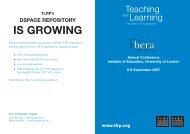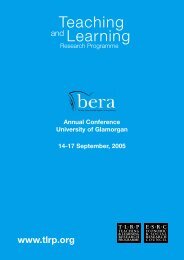Teachers - Teaching and Learning Research Programme
Teachers - Teaching and Learning Research Programme
Teachers - Teaching and Learning Research Programme
Create successful ePaper yourself
Turn your PDF publications into a flip-book with our unique Google optimized e-Paper software.
13<br />
cognition <strong>and</strong> of children’s intellectual <strong>and</strong> social development. McLaughlin calls this<br />
theory-based change <strong>and</strong> sets out to establish two key principles governing the conditions<br />
necessary to bring about effective implementation.<br />
The first of these is that educational theories need to be re-constructed so that they can<br />
adapt to the ways in which teachers have to function on a daily basis. Thus researchers<br />
have to start by gaining an underst<strong>and</strong>ing of the various factors that compete for the<br />
teachers time <strong>and</strong> attention or that conflict with the principles under which the reform has<br />
been determined. <strong>Learning</strong> about the conditions under which teachers will have to<br />
implement the change enables theories to be refined <strong>and</strong> develops a deeper underst<strong>and</strong>ing<br />
of student learning. Theories become ‘context-sensitive’.<br />
The second principle that follows from this view is that theoretical ideas must therefore<br />
be anchored in concrete teaching contexts. A useful model here is the International<br />
Academy of Education’s booklet on <strong>Teaching</strong> by Jere Brophy (2000) in which each A3<br />
page consists of a top half devoted to a particular aspect of pedagogy while the bottom<br />
half describes the consequences for classroom practice. The approach embodies the<br />
earlier definition of pedagogy as the science of the art of teaching.<br />
McLaughlin <strong>and</strong> her colleagues set out five areas that they see as central in sustaining<br />
theory-based change. The first, perhaps, obviously, concerns resources. They cite<br />
similar examples to the previously quoted Superhighways projects where teachers<br />
withdrew from the project because resources could not be sustained at the initial levels.<br />
Brown <strong>and</strong> Campione’s (1994) work, for example, involving reciprocal teaching, offered<br />
teachers a considerable amount of adult support in the classroom. Later the programme<br />
was adapted to include peer tutoring. Pupils were taught to teach other pupils rather than<br />
having researchers teaching teachers.<br />
Second, <strong>and</strong> perhaps more important, is the need for teachers to gain an underst<strong>and</strong>ing of<br />
what McLaughlin terms ‘Knowledge of First Principles’. She accepts that teachers<br />
require knowledge about the reform’s activities, materials <strong>and</strong> strategies in order to<br />
acquire ownership of the reform within their own classroom, but argues it is more

















